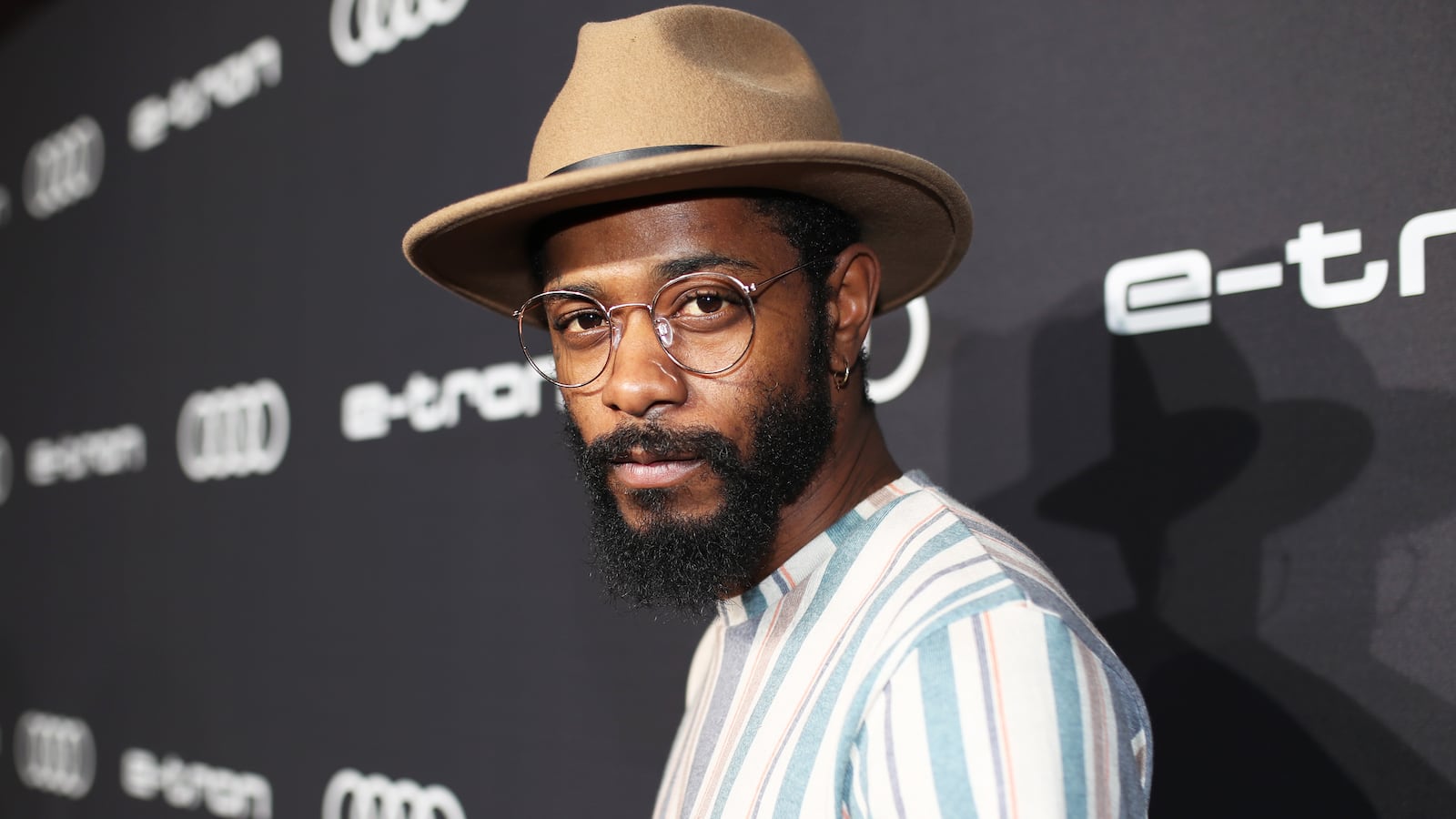Attempting to justify a Louis Farrakhan remark that compared Jews to termites, spreading conspiracy theories about Jewish people controlling the slave trade, and discussing Hitler in a positive light were only a portion of the vile anti-Semitic comments that were made during a bigoted and ignorant discussion on Clubhouse Wednesday night.
Already that evening, a previous room with a similar discussion had turned so inflammatory that a moderator shut down the talk. But instead of closing the app, some of the participants launched a second room to pick up where the first left off, titling it, “Someone Ended the Room About Farrakhan,” accompanied by the nefarious purple devil emoji.
It was during this hours-long unbridled discussion that people would take to the app’s stage to spew what a person described as one of the most disturbing things he had ever heard. “I’m not even Jewish,” Kareem Rifai told The Daily Beast. “I’m an ally to Jewish people and I was there for my Jewish friends who were there because I’m sure it was very traumatic for them. Honestly, I can’t describe it… I felt sick to my stomach for most of it.”
“Some of the things that were said were worse than things that I’ve read or heard about neo-Nazis saying, it was insane.”
So, it came as a huge surprise that among the talk’s moderators was actor LaKeith Stanfield, who was nominated for the Best Supporting Actor Oscar this year for his role as an FBI informant in Judas and the Black Messiah.
Stanfield is no stranger to the audio-based app, participating in a “moan room” in December where women gleefully judge men making sounds of ecstasy. (He ended up winning, although declined to pocket the $300 prize money.) He also used the platform in March for a casting call for his upcoming project in London.
But seeing the 29-year-old moderating and periodically engaging in the hateful discussion was upsetting to many, although four people confirmed to The Daily Beast that Stanfield never said anything that would be considered anti-Semitic.
One Jewish woman was so sickened by the things she was hearing that she took the stage to directly ask Stanfield why he was involved in a conversation that was amplifying hate speech, according to three sources. But instead of taking the opportunity to condemn the anti-Semitism running rampant in the room, Stanfield reportedly shrugged off the concern and avoided any responsibility for participating.
“He told her, ‘This is probably an emotional kind of room for you, tensions are running high, and I understand this is a very heated room,’” Rifai recalled. “Then he just kind of danced around it not really saying anything.”
“You can’t stay neutral in that type of situation, when there’s so clearly a side that is spewing hate speech and another side that’s trying to just defend themselves,” he added. “The fact he sat in that room for hours on end, making it available to thousands and thousands of people on their Clubhouse feed, it’s irresponsible.”
The Daily Beast reached out to Stanfield for comment.
Another Jewish woman involved in the chat, who asked to remain anonymous out of fear of receiving further abuse and harassment, was similarly repulsed by what had unfolded that night. She was also perplexed as to how an influential Hollywood actor, who has 79,000 followers on the app, was involved in such a vile conversation.
“It was a shame that he entered the room and that he decided the position of a moderator was the correct role for him within the space,” she said. “His reputation being on that stage was on the line. Twitter was watching and he was not calling out the anti-Semitism that was happening. Seventy-nine thousand people had the ability to come into a space where Hitler rhetoric was being used because he was in the room. Seventy-nine thousand people had the ability to come into a room where they were using the words of Farrakhan and saying it was OK against the Jewish people.”
She also did not find his explanation for being involved acceptable. “If he wants to say, ‘I want to ‘both sides’ it,’ there was a way for that conversation to happen talking about the rhetoric without perpetuating the rhetoric. The rhetoric was perpetuated, that’s the problem. The rhetoric was all Jews were termites, all Jews were Satanic, there are good Jews and bad Jews. Further, they’re good Jews and Satanic Jews, the Jews who run the banks and the media. That is what the rhetoric was.”
A second Jewish woman, who also asked not to be named out of fear of harassment, said she devotes much of her time to combating anti-Semitism, particularly on social media sites and Clubhouse. “I was hearing a lot of anti-Semitism,” she agreed. “People were just allowed to go on and on.”
“I think that a lot of people with anti-Semitism, it’s hard to point out,” she explained. “Oftentimes, it’s in the form of conspiracies or people stating these really big lies about Jewish people. Rather than directed hatred, it’s more so lies and conspiracies. One thing that a lot of people are concerned about is that there was such a big audience and if people could be impressionable. When people say these tropes about Jews, someone could hear it and believe it.”
This isn’t the first time Clubhouse has come under fire for its glaring moderation of issues that allow hate speech to go unchecked. In April, it announced it had permanently suspended several users and closed rooms after other anti-Semitic discussions were called out on Twitter. “All forms of racism, antisemitism, hate speech and abuse are prohibited in Clubhouse and are a direct violation of the Community Guidelines,” it said in a statement.
But still, Jewish people want to see actual protocols put in place to prevent this from happening again, whether that be verifying moderators or drawing inspiration from Yelp and allowing moderators to gain ratings from other users. “I’m more verified on Tinder than I am on Clubhouse,” the first woman added.
“This has been an issue since I joined the app, this is not new,” she continued. “This is something that I have lost sleep over. This is something that on Thursday at 4:59 pm, I do not feel like I have been a successful worker at my job today because I got two hours of sleep last night. I am not functioning and this is not the first time that I’ve had to deal with it. Clubhouse has brought so much joy to my Jewish life, but it’s also bringing so much hate. As much as I put moderators accountable for their rooms, I hold the creators of the app equally accountable.”
The Daily Beast reached out to Clubhouse for comment.
By Thursday, Stanfield decided to address the brewing storm head-on and joined another Clubhouse chat, this time moderated by a panel of Jewish educators, who wanted to address the hate speech they had witnessed. Jewish men and women, as well as allies, came to the stage to express how triggering the rhetoric they’d heard was.
When it was Stanfield’s turn to address the room, he thanked everyone for opening up the discussion and educating him. “It’s been a crazy couple 48 hours,” he began. “I’ve been in a couple rooms where a lot of shit has been discussed and talked about, very heightened emotional states. It’s been very enlightening and interesting to me, I never really knew that this debate existed in this way about identity, the origins of Judaism in Jewishness, and how many different interpretations there are different things, whether or not it’s a religion and ethno-religion or what it is a faith race.”
Stanfield admitted the rooms became “derailed.” “Someone would say something that was without a doubt anti-Semitic… and then instead of acknowledging why it was anti-Semitic, it would just go back to that original person, and then it would kind of repeat what they were saying, they clearly weren’t listening to us,” he said.
He also acknowledged that if he’s choosing to be a moderator in a certain room, he needs to pay “attention to what is actually being discussed and determine if that’s a discussion that you really want to get into.”
Although not quite an apology, Stanfield’s response was well-received within the room, with many thanking him for coming back and explaining himself. The Daily Beast has also learned that the Institute for Black Solidarity with Israel reached out to Stanfield, offering to have a private conversation to educate him further on the topic.
While Stanfield’s team did not respond to whether he had taken them up on the offer, he wouldn’t be the first Black actor to recently address his lack of understanding about anti-Semitism. Nick Cannon sought out an education after he was publicly fired from hosting Wild 'N Out on ViacomCBS last summer following a series of stunning comments in a now-deleted episode of his YouTube talk show.
He had repeated conspiracy theories about the Rothschilds, suggested those who lack melanin are “savages” and “evil,” and claimed Black people were “the true Hebrews” and therefore “can’t be anti-Semitic.” After widespread backlash, Cannon apologized and devoted months to learning, sitting down with rabbis, and pursuing a master’s degree in divinity. In February, with a stamp of approval from influential members of the Jewish community, ViacomCBS determined that Cannon had learned from his mistakes and reinstated him as the host of Wild 'N Out.



